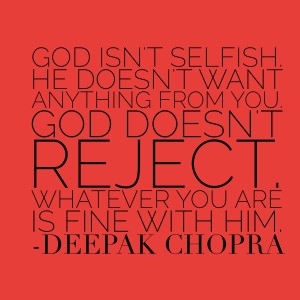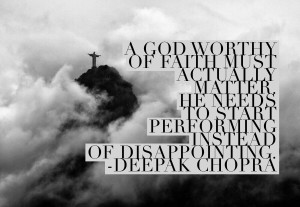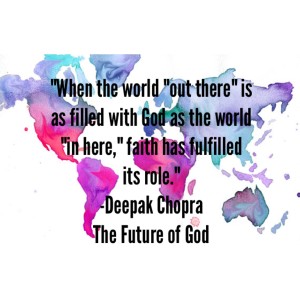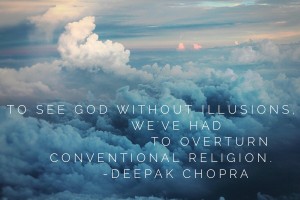By Deepak Chopra

Although the modern controversy over God centers on the famous headline fromTime magazine, “Is God Dead?” this isn’t really the key question. By definition, God can’t be dead, because “dead” implies that God was alive, and once alive, an immortal being can’t die. Yet defining God as immortal or loving or omnipotent — all the attributes assigned to the deity — solves nothing. We might as well define God as purple. All divine attributes are human projections.
The real issue, then, is how to bring these attributes into the world. If you were taught as a child that God is love, you won’t discover the truth of this teaching until God is love for you. For me, turning God into a personal experience is the only way for him (or her) to be viable. I lay out the whole argument in a new book, The Future of God. In this post there’s only room enough to deal with one attribute, love. Does God love you?
A committed atheist will assert that this question has no meaning, since we are talking about a mythical creature. But the vast majority of people are not atheists, and their answer will fall into one of three categories.
I hope that God loves me.
I have faith that God loves me.
I know that God loves me.
To cut through the morass of theology and dogma that surrounds organized religion, I think this template works. If you hope that God loves you, the connection between your life and the reality of God is very tenuous. If you have faith that God loves you, the connection is stronger, but at those times when very bad things happen to you, or to your family and friends, faith is tested by doubt. You have to hold on tight to your assumption that God exists and cares for you. God only becomes totally viable if you know that he loves you, the way you know that fire burns and chocolate tastes nice.
Showing someone how to evolve from hope to faith to knowledge is the whole point of the spiritual path. We are not born knowing God, which isn’t a fatal flaw. Babies aren’t born knowing how to read, either. The brain is completely trainable, and there is no reason that it cannot be trained using the same elements that apply when learning how to read:
— A teacher who already knows what you want to learn.
— Motivation to enter the learning process.
— Lessons that impart what you want to learn.
— Repeated experience as these lessons sink in.
I realize that this course of action sounds cut and dried compared to the inspiration that uplifts us in spiritual life, but the bald fact is that all experience must be processed by the brain, whether it’s an experience of watching television or feeling the presence of your soul. Leaving aside one’s skepticism, the experience of God’s love is real. We have thousands upon thousands of first-hand accounts, enough to motivate us to aspire to the same experience. It’s a matter of filling in all the requirements.
Teacher: If you are serious about entering the spiritual path, you need a teacher who is in a higher state of consciousness, however you want to define it. They have had the experience you want to have. Verifying this can be tricky. Just because someone sets up as a guru or an enlightened being doesn’t mean that they are appropriate teachers. But higher consciousness exists, and it isn’t rare. If you do some sensible investigation, listening to a prospective teacher and talking to their students, you will be able to sort out what feels right. Reading books is a good supplement, because the transmission of spiritual knowledge that comes from the world’s wisdom traditions can be invaluable.
Motivation: “It would be nice if God loved me” isn’t a strong enough motivation. Nor is “I’m so miserable, I need God to love me.” What you are looking for is deeper knowledge about reality. The only lasting motivation comes from actually going beyond everyday reality, which is a known quantity. To reach a deeper level of reality requires you to go inside and find those levels in yourself. Meditation and other contemplative practices are the time-honored way to go beyond the everyday world of appearances.
[youtube]http://youtu.be/42AVpelJ4jQ?list=PLdrUeeBIMbrKH0aYELs5sD4Wvv3QH4dPc[/youtube]
Lessons: Once you go inward, you will experience that your mind becomes more centered, calmer, and less overshadowed by thought. But this new found state can be either passive or active. It’s passive if you dip into it, feel better, and then go away. It’s active if you begin to identify this new place as your true self. Then the qualities of deeper reality begin to come to the surface and affect your daily life. Love is one of these qualities. Lessons in love aren’t the same as falling in love. By analogy, let’s say that someone asks you, “Did you notice how many people smile if you look at them and smile first?” It’s likely that you haven’t noticed this, or not recently. You have a choice now to perform an experiment. You can consciously decide to look at people and give them a smile. In the same way, you can test if your consciousness is becoming more loving by doing, saying, and thinking more lovingly.
Repetition: As you test out the experience of being more loving, a feedback loop is being set up in your brain. You are training it to notice something new, and the more it notices, the more sensitive, alert, and perceptive you will become in matters of love. You are on a path known in Sanskrit as Bhakti, the path of devotion. Devotion is entirely about finding love in everything, as a universal quality. Anything universal belongs in the domain of the divine, whether you apply the word God to it or not. It’s enough to know that your experience reveals love in every particle of existence.
I love the devotional poems of Rumi, Kabir, Mirabai, and the other great writers in the Bhakti tradition, but I’m also a realist. To find divine love means coming to grips with reality beyond the emotion of love (or hate) that comes and goes. I must move from hope to faith to knowledge. The journey will take me to unexpected places, some of them difficult to visit. We all harbor memories, beliefs, and old conditioning that block love or even oppose it, that feel bitter and wounded, that want to defend non-love in order not to be hurt again. Yet if love is a universal quality, intrinsic to consciousness itself, no journey is more rewarding. It’s worth the time, effort, and dedication to discover that your true self is love.
Deepak Chopra, MD is the author of more than 80 books with twenty-two New York Times bestsellers including Super Brain, co-authored with Rudi Tanzi, PhD. He serves as the founder of The Chopra Foundation and co-founder of The Chopra Center for Wellbeing. The Future of God (Harmony, November 11, 2014)




